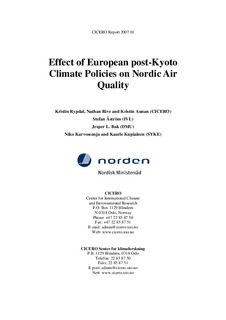Effect of European post-Kyoto Climate Policies on Nordic Air Quality
Rypdal, Kristin; Rive, Nathan; Aunan, Kristin; Åström, Stefan; Bak, Jesper L.; Karvosenoja, Niko; Kupiainen, Kaarle
Research report
Permanent lenke
http://hdl.handle.net/11250/191986Utgivelsesdato
2007Metadata
Vis full innførselSamlinger
- CICERO Reports [210]
Sammendrag
Stricter commitments for GHG emissions in the post-Kyoto period will contribute to reduced emissions of air pollutants in the Nordic countries, avoided costs for end-of-pipe abatement to reach a specific target, and benefits for ecosystems and human health. However, reductions in emissions in the Nordic countries are smaller than in other regions since use of the flexible mechanisms implies a shift in GHG abatement, and co-benefits, to other regions – in particular Russia and Eastern Europe. On the other hand, the Nordic countries benefit from reductions in emissions in other regions. Expanding the number of sectors included in the emission trading scheme will imply increased air pollutant emissions and less benefits to ecosystems. If EU and Norway are involved in a climate policy cooperation not involving other regions, this will imply that more greenhouse gas emission reductions are undertaken in the Nordic countries with subsequent reductions in air pollutant emissions. This would benefit ecosystems in southern Scandinavia, but acidification would increase in the north because of increased emissions in Russia. For human exposure to PM2.5, road transport is particularly important and this source is less influenced by the options for climate policies. Therefore, as long as post-Kyoto climate policies are unknown, there are large uncertainties about the required costs to achieve different level of air pollutant emissions, ecosystem protection and human exposure in 2020. A large part of this uncertainty comes from the degree of Russian and Eastern Europe climate policy cooperation.
